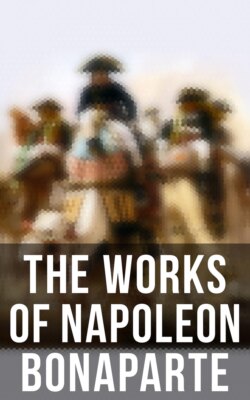Читать книгу The Works of Napoleon Bonaparte - Louis Antoine Fauvelet de Bourrienne - Страница 90
На сайте Литреса книга снята с продажи.
Proclamation to the Soldiers on Entering Milan, May 15, 1796.
ОглавлениеTable of Contents
"Soldiers: You have rushed like a torrent from the top of the Apennines; you have overthrown and scattered all that opposed your march. Piedmont, delivered from Austrian tyranny, indulges her natural sentiments of peace and friendship towards France. Milan is yours, and the Republican flag waves throughout Lombardy. The Dukes of Parma and Modena owe their political existence to your generosity alone. The army which so proudly threatened you can find no barrier to protect it against your courage; neither the Po, the Ticino, nor the Adda could stop you for a single day. These vaunted bulwarks of Italy opposed you in vain; you passed them as rapidly as the Apennines. These great successes have filled the heart of your country with joy. Your representatives have ordered a festival to commemorate your victories, which has been held in every district of the Republic. There your fathers, your mothers, your wives, sisters, and mistresses rejoiced in your good fortune, and proudly boasted of belonging to you. Yes, soldiers, you have done much,—but remains there nothing more to do? Shall it be said of us that we knew how to conquer, but not how to make use of victory? Shall posterity reproach us with having found Capau in Lombardy? But I see you already hasten to arms. An effeminate repose is tedious to you; the days which are lost to glory are lost to your happiness. Well, then, let us set forth! We have still forced marches to make, enemies to subdue, laurels to gather, injuries to revenge. Let those who have sharpened the daggers of civil war in France, who have basely murdered our ministers, and burnt our ships at Toulon, tremble! The hour of vengeance has struck; but let the people of all countries be free from apprehension; we are the friends of the people everywhere, and those great men whom we have taken for our models. To restore the capitol, to replace the statues of the heroes who rendered it illustrious, to rouse the Roman people, stupefied by several ages of slavery,—such will be the fruit of our victories; they will form an era for posterity; you will have the immortal glory of changing the face of the finest part of Europe. The French people, free and respected by the whole world, will give to Europe a glorious peace, which will indemnify them for the sacrifices of every kind which for the last six years they have been making. You will then return to your homes and your country. Men will say as they point you out, 'He belonged to the army of Italy.'"
